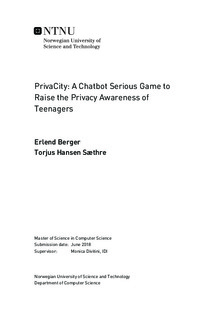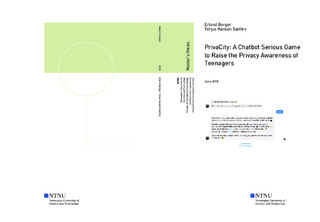| dc.description.abstract | In the modern society collection of data happens everywhere, and consequently, privacy is an ever-growing concern. It has been shown that people, and especially teenagers, lack awareness around the data they share and the associated privacy risks. Furthermore, no one has taken on the responsibility of training teenagers to become responsible digital users with a good understanding of the privacy risks they expose themselves to.
A lot of focus is dedicated to raising awareness around what to share and not to share on social networks, but little is done to learn about the risks of the digital footprints left by simply using digital services. Services may seem free of charge; however, they are not paid for with money - but with personal information. In smart cities, data is collected about the citizens across a multitude of small digital sensors, which raise privacy concerns on how the information can and should be used.
This thesis explores how chatbot serious games can be used as a tool to raise privacy awareness. The focus is on which game elements work well in a chatbot serious game - both to engage the player, and to raise his awareness. To answer this we have conducted a literature review on existing chatbot serious games, designed and developed PrivaCity as a chatbot prototype for a serious game to raise privacy awareness on digital risks in smart cities. The game and its elements have been evaluated with 104 Norwegian teenagers as participants. Finally, based on the experiences made in the previous steps, a set of guidelines for chatbot serious games is presented. The guidelines can be used by anyone wishing to design or develop a chatbot serious game.
Through the evaluation of the game PrivaCity, it is found that the game elements that work best for learning and raising awareness in a chatbot serious game are quizzes, real-life examples and seeing the consequences of one's actions. The game elements that work best to engage the player are curiosity and being able to explore freely, and to shape the narrative and story of the game with actions. The game PrivaCity mainly focuses on the privacy concerns of a smart city. But by utilizing the knowledge and guidelines presented in this report, one can also design a successful chatbot serious game for other scenarios or problem domains. | |

